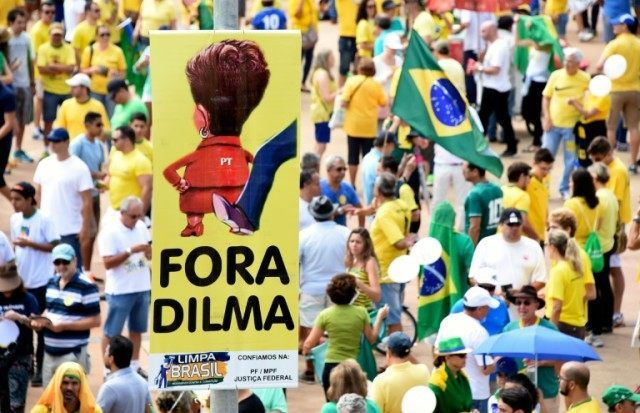Sao Paulo (AFP) – Some three million Brazilians enraged at corruption, recession and demanding the removal of leftist President Dilma Rousseff demonstrated across Latin America’s biggest nation Sunday.
Chanting “Dilma out!” and draped in the bright yellow and green national flag, protesters across Brazil sought to pressure Congress into accelerating impeachment proceedings against the leftist leader.
The huge turnout was likely to spur deputies in Congress who had been wavering over whether or not to drop support for the embattled president.
In Sao Paulo, the most populous city and an opposition stronghold, a sea of people filled the central avenue for a protest that state police said drew a “historic” 1.4 million demonstrators.
A police count compiled by news site G1 found that some 1.3 million more protesters attended rallies at other cities around Brazil, not counting Sao Paulo or a large demonstration in Rio de Janeiro. Added together, the figures pointed to an overall turnout of around three million.
“We are at a decisive moment for our country. We are going to start the change now,” said Rogerio Chequer, leader of Vem Pra Rua, one of the main organizers of the demonstrations, at the Sao Paulo protest.
Helio Bicudo, a prominent lawyer who once supported the government but helped initiate the push for impeachment told the Sao Paulo protesters: “Brazil can’t take being looted and robbed anymore, it can’t take more incompetence and corruption.”
In Rio de Janeiro, which will host the Summer Olympics in August, protesters singing and dancing to samba songs swarmed along the beachfront avenue in Copacabana.
Organizers said that up to a million people attended, but police would not confirm this and there was no immediate way to verify conflicting claims.
About 100,000 people marched in the capital Brasilia, a police source told AFP. Some 400 cities in all took part.
– Fears of violence –
Rousseff and her Workers’ Party are struggling to hold on to power in the face of a probe into a massive bribes and embezzlement scandal at state oil company Petrobras.
Prosecutors’ highest-profile target is Rousseff’s key mentor in the Workers’ Party, ex-president Luiz Inacio Lula da Silva.
Prosecutors have filed money laundering charges and requested he be put into preventative detention. Lula vigorously denies the allegations.
Rousseff is also blamed by many for the worst recession in decades, with the economy shrinking 3.8 percent last year and the country losing its investment grade credit ratings.
With divisions intensifying across the country, Rousseff appealed for demonstrators to refrain from violence — and they did.
In Sao Paulo, many protesters brought their children, as if on a family outing, while in Rio demonstrators paused between singing samba tunes to buy coconut water from street hawkers.
Still, there was no disguising the anger.
“We need to get rid of Dilma, the Workers’ Party, the whole lot,” said Rio resident Maria do Carmo, 73, who was carrying a Brazilian flag. “It’s not their time anymore.”
Many protesters held placards depicting Rousseff and Lula as prisoners, while others praised the chief investigating judge in the Petrobras scandal, Sergio Moro, as “Our national pride.”
“I want Dilma’s impeachment now,” said Gaudino Inacio, 70, at the Sao Paulo demonstration.
“She’s useless because she is unable to govern the country. After, we can have new elections.”
– Impeachment pressure –
A bid was launched in Congress late last year to impeach Rousseff over allegations that her government illegally manipulated accounts to boost public spending during her 2014 reelection campaign.
The impeachment procedure has stalled, but looks set to pick up again. And analysts said deputies will have watched turnout on Sunday closely before deciding which way they should vote.
Judging by the police figures, that turnout exceeded anything seen in the past — amounting to a humiliating vote of no-confidence in Rousseff’s administration.
The biggest anti-government protest last year, in March, included an estimated 1.7 million people across Brazil, with a million in Sao Paulo alone. Some 1.2 million people attended another six months later.
In any case, Rousseff’s problems are rapidly piling up.
With Lula fighting for his political life, Rousseff is at risk of losing a vital ally, while a leaked report in a Brazilian magazine suggests that she too may be accused in the Petrobras probe.
Now a new threat is looming over Rousseff — the potential exit of the PMDB party from a shaky coalition with her Workers’ Party. Party members agreed on Saturday to decide in 30 days.

COMMENTS
Please let us know if you're having issues with commenting.